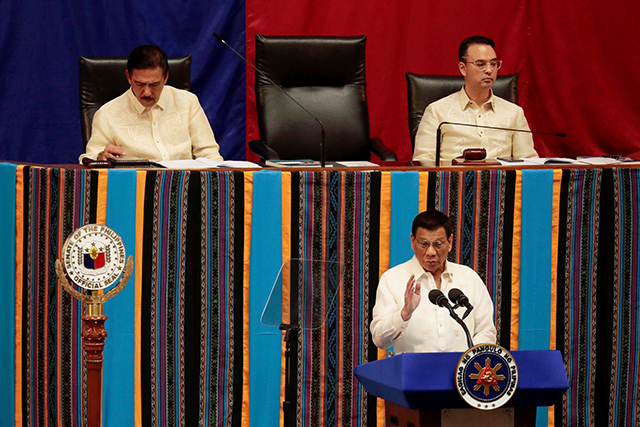Lengthy rants, vague stance on the West Philippine Sea territorial row, objectification of women and reimposition of the death penalty are the most talked-about parts of President Rodrigo Duterte’s State of the Nation Address on social media platforms.
Duterte arrived nearly an hour late for his fourth SONA on Monday, July 22. This will be the third time he delivered a delayed address since 2017.
Buzz around Duterte’s chosen topics
Duterte’s SONA this year lasted for about an hour and 34 minutes.
Defending his policy over the West Philippine Sea
Duterte gave conflicting statements about the country’s relationship with China and efforts to reinforce maritime rights.
He initially purported that China is now in possession of the Spratlys and the Panganiban Islands because of former Foreign Affairs Secretary Albert del Rosario.
He also said that President Xi Jinping once told him that taking action in the waterway could “mean trouble.”
“Sila ‘yung in possession and claiming all the resources there as an owner,” Duterte said.
He later said that the country has ownership over the disputed areas but “not in control.”
He then assured the public that there are no conditions in the country’s entitlements over the West Philippine Sea—the part of the South China Sea legally in the Philippines’ jurisdiction.
“The West Philippine Sea is ours. There are no ifs and buts. It is ours. But we have been acting, [applause] along that legal truth and line. But we have to temper it with the times and the realities that we face today,” Duterte said.
Some Filipinos aired their confusion on these statements online.
Concerning the controversial ramming on Reed Bank, Duterte erroneously said that he invoked “traditional fishing rights” to allow China to operate in the area.
Reed Bank is part of the Philippines’ 200-nautical mile exclusive economic zone where the communist country is not entitled to fish in the first place, basing on the Constitution.
Remark on women
The president did not spare the all-important yearly address from off-color remarks about women.
When talking about the rehabilitation of Boracay, the president quipped that Filipino girls are waiting for foreigners there.
“Boracay Island is just the beginning. And the girls there, the foreigners are waiting for you gentlemen to visit the place. They are all on the beach sunbathing. You are invited to—I have not been there,” he said.
Sen. Risa Hontiveros, the primary author of the new Safe Spaces Act against street-level harassment, criticized this message despite it being downplayed as a joke.
“A dangerous pronouncement coming from the [chief executive] who has the power to embolden others to see women in a similar undignified manner. Shame,” Hontiveros tweeted.
Duterte also told off-script stories about his “girlfriend” not being able to take a bath due to a water shortage in Davao City.
Death penalty
Duterte urged members of Congress to pass a measure to restore capital punishment for crimes related to illegal drugs and plunder.
“I respectfully request Congress to reinstate the death penalty for heinous crimes [applause] related to drugs, as well as plunder,” he said.
Duterte similarly remained adamant that his bloody war on drugs, which has taken the lives of thousands of poor, male Filipinos, will continue despite international and local condemnation over human rights violations.
“I am aware that we still have a long way to go in our fight against this social menace. Let the reason why I advocate the imposition of the death penalty for crimes related to illegal drugs,” he said.
However, he also said that corruption caused this problem and should be eliminated first.
“The illegal drug problem persists. Corruption continues and emasculates the courage we need to sustain our moral recovery initiatives,” he said.
Some people on Twitter found his comments on corruption ironic, made before the presence of politicians formerly accused of or convicted of graft and plunder.
Meanwhile, others questioned the exclusion of proposed measures against atrocious crimes on human rights.
New Cabinet-level agencies
Duterte also suggested the creation of new Cabinet departments for water resources, disaster management and welfare of overseas Filipino workers.
However, there are already existing agencies mandated to handle these sectors.
The Metropolitan Waterworks and Sewerage System and the National Water Resources Board regulate the provision of water resources across the country.
The Overseas Workers Welfare Administration and the Philippine Overseas Employment Administration, meanwhile, have long been in charge of monitoring OFWs abroad.
The National Disaster Risk Reduction Management Council is a state-run organization on disaster resilience of local governments.

